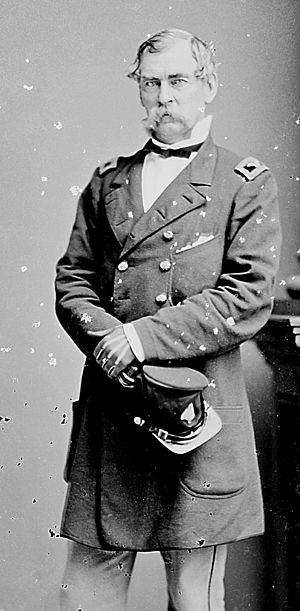Charles Ferguson Smith facts for kids
Quick facts for kids
Charles Ferguson Smith
|
|
|---|---|
 |
|
| Born | April 24, 1807 Philadelphia, Pennsylvania |
| Died | April 25, 1862 (aged 55) Savannah, Tennessee |
| Place of burial |
Laurel Hill Cemetery, Philadelphia, Pennsylvania
|
| Allegiance | United States of America Union |
| Service/ |
United States Army Union Army |
| Years of service | 1825–1862 |
| Rank | |
| Commands held | Department of Utah 3rd U.S. Infantry Regiment 2nd Division, AotT Army of the Tennessee |
| Battles/wars | Mexican–American War |
| Other work | Commandant of Cadets |
| Signature | |
Charles Ferguson Smith (born April 24, 1807 – died April 25, 1862) was an important officer in the United States Army. He fought in the Mexican–American War and became a general for the Union side during the American Civil War.
Contents
Early Life and Military Career
Charles Ferguson Smith was born in Philadelphia, Pennsylvania. He went to the West Point military school and graduated in 1825. After graduating, he became a second lieutenant in the artillery.
He slowly moved up in rank in the army. Smith returned to West Point as a teacher. From 1838 to 1843, he was the Commandant of Cadets. This meant he was in charge of all the students.
Fighting in the Mexican-American War
Smith showed great bravery and skill during the Mexican–American War. He served under famous generals like Zachary Taylor and Winfield Scott. He fought in important battles such as Palo Alto, Resaca de la Palma, Monterrey, and Churubusco.
Because of his excellent service, he received special promotions. He ended the war as a lieutenant colonel in the regular army. After the war, he helped keep order in Mexico City until 1848.
Service Before the Civil War
Before the Civil War, Smith led an expedition into what is now Minnesota in 1856. He also served in Utah from 1857 to 1860. For a time, he was in charge of the military department in Utah. Just before the Civil War started, he briefly commanded troops near Washington, D.C.
Civil War Service
When the Civil War began in 1861, Smith was put in charge of recruiting new soldiers. He was made a brigadier general in the volunteer army. He also became a colonel in the regular army. Soon, he was sent to the Western Theater of the war.
Working with General Grant
Smith became a division commander under Brigadier General Ulysses S. Grant. Grant had actually been one of Smith's students at West Point. This could have been an awkward situation, but Smith was very loyal to Grant. He respected Grant's leadership.
Smith led his division of new soldiers successfully at the Battle of Fort Donelson in February 1862. His experience and strong character made him a key helper for Grant in the early days of the war.
Injury and Later Days
At one point, Grant's commander, Henry Halleck, briefly removed Grant from leading the army. Halleck gave that job to Smith instead. However, Grant was soon put back in command. This was good because Smith had an accident. He injured his leg while jumping into a rowboat.
This injury forced Smith to stop leading troops in the field. His division was then led by another general, W. H. L. Wallace, at the Battle of Shiloh.
Death and Legacy
Charles Ferguson Smith died on April 25, 1862, in Savannah, Tennessee. He passed away from an infection caused by his leg injury and a long illness called dysentery. He was buried in Laurel Hill Cemetery in Philadelphia.
His early death meant the Union army lost a very good leader. Many felt his absence, especially at the Battle of Shiloh. A month before he died, he had been promoted to major general.
Two forts were named in his honor. One was Fort C. F. Smith near Washington, D.C., which helped defend the capital during the Civil War. Another Fort C. F. Smith was built in the Montana Territory.
 | Chris Smalls |
 | Fred Hampton |
 | Ralph Abernathy |

